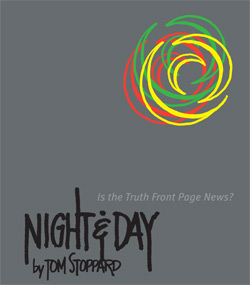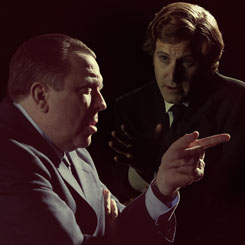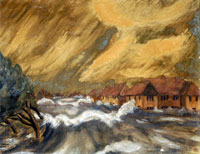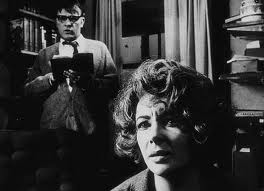Here’s my list of recommended Broadway, off-Broadway, and out-of-town shows, updated weekly. In all cases, I gave these shows favorable reviews (if sometimes qualifiedly so) in The Wall Street Journal when they opened. For more information, click on the title.
Warning: Broadway shows marked with an asterisk were sold out, or nearly so, last week.
BROADWAY:
• Bloody Bloody Andrew Jackson (musical, PG-13/R, reviewed here)
• La Cage aux Folles (musical, PG-13, adult subject matter, reviewed here)
• Driving Miss Daisy * (drama, G, possible for smart children, closes Jan. 29, reviewed here)
• Fela! (musical, PG-13, adult subject matter, closes Jan. 2, reviewed here)
• A Life in the Theatre (serious comedy, PG-13, closes Jan. 2, reviewed here)
• Lombardi * (drama, G/PG-13, a modest amount of adult subject matter, reviewed here)
• Million Dollar Quartet (jukebox musical, G, reviewed here)
• The Pitmen Painters (serious comedy, G, too demanding for children, closes Dec. 12, reviewed here)
OFF BROADWAY:
• Alfred Hitchcock’s The 39 Steps (comedy, G, suitable for bright children, original Broadway production reviewed here)
• Angels in America (drama, PG-13/R, adult subject matter, closes Feb. 20, reviewed here)
• Avenue Q (musical, R, adult subject matter and one show-stopping scene of puppet-on-puppet sex, reviewed here)
• The Fantasticks (musical, G, suitable for children capable of enjoying a love story, reviewed here)
CLOSING SOON IN CHICAGO:
• Night and Day (serious comedy, PG-13, extended through Nov. 14, reviewed here)

 Best of all, we’ve returned to the
Best of all, we’ve returned to the  Remy Bumppo Theatre Company, which specializes in brainy, challenging scripts, is doing a real service to the republic of letters by reviving “Night and Day,” the most obscure of Tom Stoppard’s major plays. It had only a modest run on Broadway in 1979 and hasn’t been performed anywhere in New York since 2001, and I regret to say that I think I know why. Mr. Stoppard’s slightly-right-of-center opinions, which are anathema to most theater people, are rather easier than usual to discern from the plot of “Night and Day,” in which Dick Wagner (Shawn Douglass), an amiably unscrupulous left-wing foreign correspondent, wanders into an unnamed African country in search of hot copy and stumbles onto a story that blows up in his face….
Remy Bumppo Theatre Company, which specializes in brainy, challenging scripts, is doing a real service to the republic of letters by reviving “Night and Day,” the most obscure of Tom Stoppard’s major plays. It had only a modest run on Broadway in 1979 and hasn’t been performed anywhere in New York since 2001, and I regret to say that I think I know why. Mr. Stoppard’s slightly-right-of-center opinions, which are anathema to most theater people, are rather easier than usual to discern from the plot of “Night and Day,” in which Dick Wagner (Shawn Douglass), an amiably unscrupulous left-wing foreign correspondent, wanders into an unnamed African country in search of hot copy and stumbles onto a story that blows up in his face…. The more I see of Chicago’s TimeLine Theatre Company, the more impressed I am by the way in which it goes about its self-defined task of producing historical dramas “that connect with today’s social and political issues.” That may sound like an eat-your-spinach-and-like it mission statement, but TimeLine takes great care to choose interesting plays, then mounts them in its 87-seat theater with a combination of panache and flamboyant physical dynamism that I find irresistible.
The more I see of Chicago’s TimeLine Theatre Company, the more impressed I am by the way in which it goes about its self-defined task of producing historical dramas “that connect with today’s social and political issues.” That may sound like an eat-your-spinach-and-like it mission statement, but TimeLine takes great care to choose interesting plays, then mounts them in its 87-seat theater with a combination of panache and flamboyant physical dynamism that I find irresistible. Not great, you understand, so don’t be fooled by the near-hysterical quotes from London’s critical corps that have been trotted out as sucker bait for Manhattan theatergoers. Stripped of the finger-wagging socialist sermonizing that spoils the last ten minutes of the play, “The Pitmen Painters” is a “Full Monty”-type commercial comedy about five working-class blokes with inch-thick accents (“We just want to knaa aboot proper art”) who turn out to be smarter, nobler and more talented than Robert Lyon (Ian Kelly), the well-meaning but unconsciously patronizing university man who deigns to introduce them to the joys of painting. But if you don’t mind going along with Mr. Hall and the accomplished ensemble cast that executes his well-worn tricks, you’ll find “The Pitmen Painters” to be both entertaining and touching–as well as unexpectedly intelligent whenever the characters discuss the art form that has changed their lives….
Not great, you understand, so don’t be fooled by the near-hysterical quotes from London’s critical corps that have been trotted out as sucker bait for Manhattan theatergoers. Stripped of the finger-wagging socialist sermonizing that spoils the last ten minutes of the play, “The Pitmen Painters” is a “Full Monty”-type commercial comedy about five working-class blokes with inch-thick accents (“We just want to knaa aboot proper art”) who turn out to be smarter, nobler and more talented than Robert Lyon (Ian Kelly), the well-meaning but unconsciously patronizing university man who deigns to introduce them to the joys of painting. But if you don’t mind going along with Mr. Hall and the accomplished ensemble cast that executes his well-worn tricks, you’ll find “The Pitmen Painters” to be both entertaining and touching–as well as unexpectedly intelligent whenever the characters discuss the art form that has changed their lives…. Forty-eight years after the fact, it’s easy to forget that the controversy that greeted the premiere of “Virginia Woolf,” which in 1962 was thought by many Americans to be frank to the point of obscenity, made Edward Albee famous. How famous? Enough so that Johnny Carson invited him onto “The Tonight Show” four years later to promote his latest play, “A Delicate Balance.” (He shared the Carson couch with Duke Ellington.) Not long afterward, Life magazine published a lengthy, lavishly illustrated profile of Mr. Albee. In the ’60s, you couldn’t get much more famous than that….
Forty-eight years after the fact, it’s easy to forget that the controversy that greeted the premiere of “Virginia Woolf,” which in 1962 was thought by many Americans to be frank to the point of obscenity, made Edward Albee famous. How famous? Enough so that Johnny Carson invited him onto “The Tonight Show” four years later to promote his latest play, “A Delicate Balance.” (He shared the Carson couch with Duke Ellington.) Not long afterward, Life magazine published a lengthy, lavishly illustrated profile of Mr. Albee. In the ’60s, you couldn’t get much more famous than that….